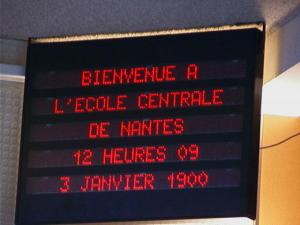Remember Y2K?

I do.
In the late nineties, as the year 2000 approached and everyone prepared to trade in their cars for flying machines, we started hearing about something called “Y2K.” At first I thought this was a knock-off of the singing group Boyz II Men, but it was in fact a computer bug, and meant that the disk space that computer engineers had saved for pictures of people’s pets was going to be needed to express the year in four digits instead of two.
Yes, the looming end-of-millennium disaster, the moment where humanity would finally face judgment for its wickedness and fanny packs, was not an asteroid, or Godzilla, or aliens, but the inability of computers to express the year in more than two digits. How exciting. Engineering hadn’t failed us – Hollywood had. I had to picture the disaster myself: At the moment the year changed from 1999 to 2000, and people everywhere were trying to pop champagne without breaking any rare vases, computers would think it was the year 1900 and instantly turn into ticker tape machines.
It is hard to exaggerate the hysteria that surrounded the Y2K bug. I will try anyway.
Planes were going to fall out of the sky. Bank records would be deleted. Toilets would overflow. My biggest worry was that report cards would be lost, including the 90 I got in English junior year, mainly on the strength of my essay on Lady Macbeth’s shoe collection.
The government and corporations began spending billions of dollars on Y2K compliance, and I started spending my weekends going through all my old homework assignments and adding “19” to every date. There were some who criticized the prevention, saying we were going too far. One critic said that the Y2K bug would cause nothing more than a few blank TV screens. When people heard that they doubled their efforts. We all went around telling everyone that there was no way we were going to be flying when midnight struck. For months I did nothing but make preparations to not be in an airplane at the stroke of midnight.
As New Year’s Eve approached, I decided I would not take any chances by going to some booze fest in a major metropolitan area. So instead I went to a booze fest in the country, at the home of a friend of mine that, he assured me, was not in the way of any flight path. It was a fun party and only a few people threw up – obviously from Y2K jitters. We were all worried about our digital infrastructure as well as our coats, which had no doubt been tossed onto a bed along with many other similar-looking coats.
Soon it was time to prepare for the new year and the awkward election between kissing, shaking hands, or waving. The ball in Times Square began its descent. Dick Clark began the final countdown. The 1980s band Europe sang “The Final Countdown.” In those last seconds I braced against the inevitable, took one last look at the world as I knew it, and took the last brownie, confident that no one would say anything at such a moment.
The ball hit the ground, and…nothing. No planes fell out of the sky. No bank accounts were deleted. One toilet overflowed, but I don’t think that had anything to do with computers. The world’s digital infrastructure was fine, and I was going to have to pay back my student loans after all. “Auld Lang Syne” was just as depressing as ever.
No major problems were recorded, and the critics said this was proof that Y2K was a hoax all along. “You see?” they said, “We were right. You spent billions on Y2K compliance, and nothing happened.” And the people who spent those billions said, “Exactly.”
The Y2K bug is thankfully, along with paying for news and music, part of the past. Now we can live in simple peace and harmony and await the “Y10K” bug in 9999. Maybe by then I’ll have found my coat.